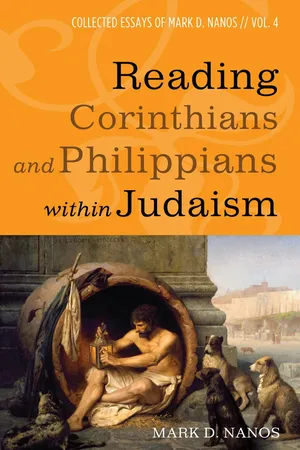![]()
Part I
Corinthians
![]()
1
The Polytheist Identity of the “Weak,” and Paul’s Strategy to “Gain” Them
A New Reading of 1 Corinthians 8:1—11:1
[179] When it comes to identifying those Paul describes as ἀσθενής in 1 Corinthians 8—usually translated “weak”—there are many interpretations on offer. But when it comes to the question of their identity as Christ-believers, there is only one. That they are Christ-believers is apparently so obvious that interpreters often proceed without discussion. However, I propose that the consensus is likely mistaken, that the ἀσθενής are “polytheists” who do not believe in the message of good in Jesus Christ that Paul proclaims, and in which his recipients believe. From Paul’s perspective, the Corinthians need to recognize that the ἀσθενής are also ἀδελφοί (brothers/sisters) on behalf of whom Christ died. They should thus be sincerely concerned with the harmful impact that their proposed eating of idol food as if merely ordinary food would have upon these “unbelievers.”
I will employ the translation “impaired” to refer to the ἀσθενής. Impaired highlights that they are being objectified by Paul (if not already [180] by his audience as well) to be unable to function in the way that he expects of those with properly working sensibilities, lacking the proper sense of what is true about the divine. For Paul writes that the συνείδησις, that is, the “consciousness,” “awareness,” “sensibilities,” or “sense of what is right” of these ones is impaired. This aspect of their state of being makes less sense for the modifier “weak.” If the impaired eat idol food, it is their “sensibilities,” rather than themselves, that will become “soiled” (8:7) and “wounded” (v. 12). The impaired ones are described as those without “the knowledge” Paul’s addressees share, namely, that there is no such thing as an idol in the world, and that God is one (vv. 1, 4, 7), or the different roles of God the Father and Jesus Christ (v. 6). It is the impaired ones’ sense of what is right that is ironically “strengthened” to continue to perceive things incorrectly (v. 10), to continue without the knowledge that could keep them from destroying themselves (vv. 7, 11).
In contrast to the impaired ones, Paul addresses those in Corinth with γνῶσις (“knowledge”) that idols are meaningless, and that there is no God but the One (8:4), as well as the roles of God the Father and Jesus Christ (v. 6), whom I will refer to as “the knowledgeable.”
Paul’s terms for these people or groups do not precisely express oppositional categories. The ones with “knowledge” or “wisdom” (specifically, about idols and gods being meaningless) are contrasted with [181] those without this knowledge or wisdom (ἀλλ’ οὐκ ἐν πᾶσιν ἡ γνῶσις), the ignorant, one might say, although Paul does not use precisely that term for them. Instead, once he has explained in v. 7 that for those who lack knowledge it is their “sense of what is right” (συνείδησις) that is ἀσθενής, he continues to refer to them as the impaired ones. The opposite of the identifications “weak” or “impaired ones” would logically be to “the strong” or “healthy ones,” and indeed many interpreters refer to the ones with knowledge as the strong. But apart from referring to them having “power (ἐξουσία)” (actually to “that power of yours [ἡ ἐξουσία ὑμῶν αὕτη],” which carries a sarcastically dismissive tone), Paul does not use “strong” or “powerful” to refer to their state. Thus, to refer to the weak versus the strong implies a different contrast than the one Paul articulates. The contrast he draws has the knowledgeable on one side, the impaired on the other. That uneven comparison is useful to keep in view. And while he addresses his instructions to the knowledgeable, it is less clear that he addresses the impaired, that they are even part of the encoded or the actual audience Paul envisages will hear the letter read; rather, he writes about the impaired, and the impact of the behavior of the knowledgeable upon them. In addition, Paul seems to employ “knowledgeable ones” with an ironic edge, even to be sarcastic, since they do not exhibit appropriate knowledge of what Paul esteems to be the most important concepts and values, like love over rights, which he spells out to them. His parent-like ironic response to the questions they apparently raised to him about eating idol food implied, if not outright stated, disagreement. It reflects his perception, at least his posture, that they think they know more than Paul does [182] about the matters at hand. To call them knowledgeable in the midst of an instruction that signals what they fail to perceive, cuts with an ironic edge calculated to put them in their place.
Probable objections to the idea that Paul’s message in these chapters primarily addresses issues across a Christ-believing/polytheist line instead of inter-Christian factionalism, and to the notion that Paul would write of polytheist idolaters as “brothers/sisters” of the Corinthians addressed, will be discussed after the prevailing views, and a new proposal based upon the issues arising in the text itself, have been presented.
The Prevailing Views for the Identity of the Impaired
The “impaired” are generally perceived to be Christ-believers insecure about the implications of their newly found faith. They are unable to eat food dedicated to idols as if religiously meaningless, having been “until now accustomed to eating idol food as if [sanctified] to idols (τῇ συνηθείᾳ ἕως ἄρτι τοῦ εἰδώλου ὡς εἰδωλόθυτον εσθίουσιν)” (8:7). If they were to see the knowledgeable ones “reclining at an idol’s temple,” they might “be strengthened to eat food sacrificed to idols” (8:10), against their own sense of what is right, which has not yet adjusted ...
